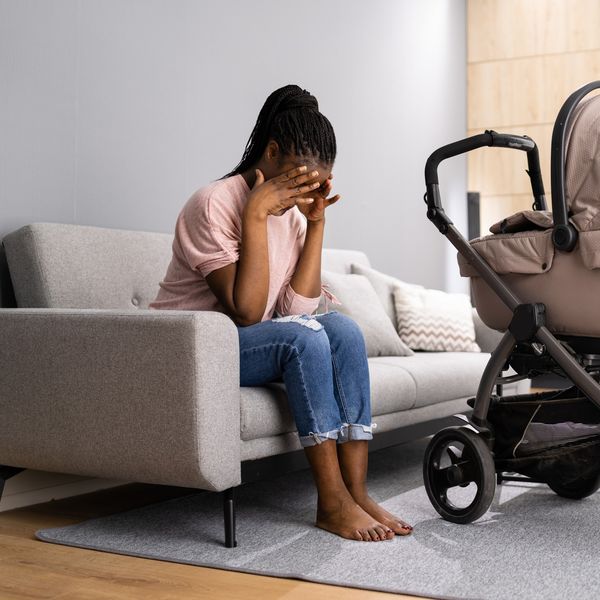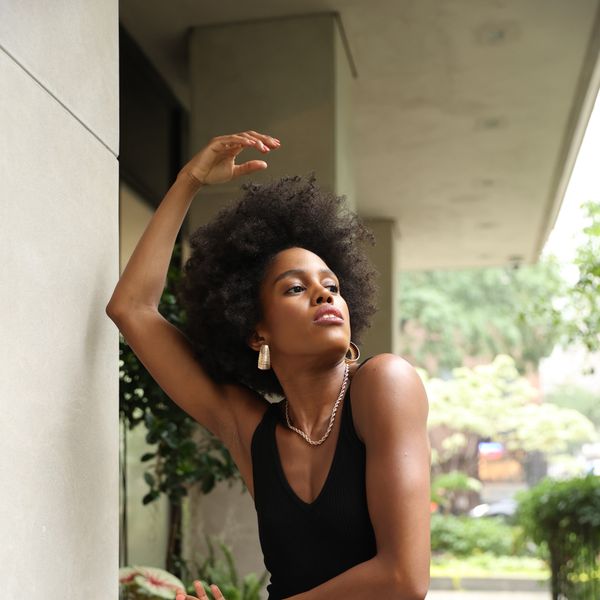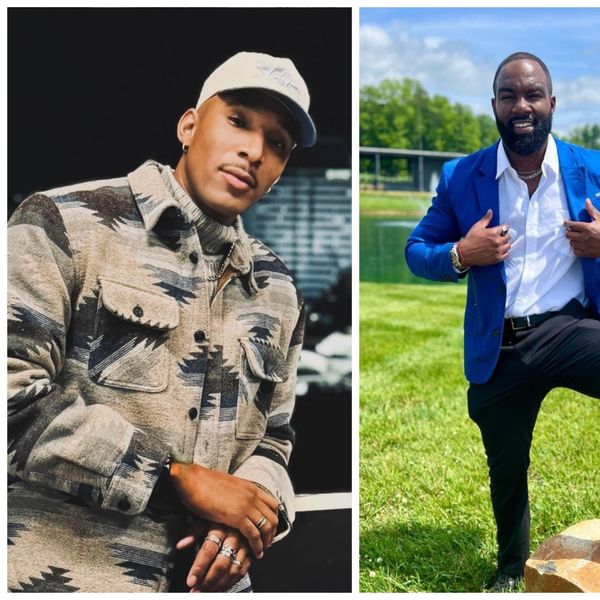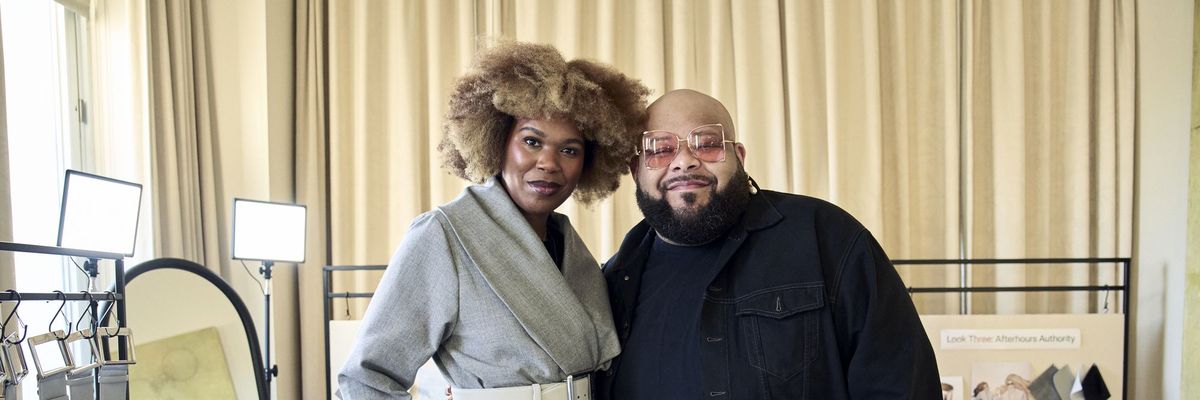Black Men On How Mental Health Struggles Impacted Their Relationships

I remember the first time I started to notice I was struggling with my mental health. It was three years ago and I was completely burnt out. I was getting anxious and worried about every sudden change that happened, and I was irritable about everything. It affected my work, my relationship with my family, and my love life. We always hear about how "strong" Black women are. We are women who get up every day to run our own businesses, climb up the corporate ladder, take care of the children, support our friends/partner, and uplift the next woman all at the same damn time.
Doesn't that sound exhausting—to be expected to carry all of these things on your shoulders and to still show up with a smile on your face? This can take a toll on anyone—mentally, spiritually, and emotionally. In the same way that Black women are not given enough space to really talk about their struggles, it's the same, if not worse, for our Black men. Black men have their own weight of the world to carry and have been conditioned to avoid addressing how their mental health has impacted their lives, especially in relationships.
I know we have all experienced relationships or friendships when things just feel "off". We can either assume the guy is "trippin'" or we can accuse the guy of acting immature. But what if it's deeper than that? Just like we Black women have our days working with our own issues, it could be applied to men, too. What if the guy you are dating is dealing with a mental health issue and hasn't figured out how to really balance it, in the name of love?
I am all for providing a safe space for both my Black men and women to really understand where each of us is coming from. These four Black men were able to be completely honest with me with the deets on what goes on in their minds for matters of the heart:
*Some responses have been edited for length and clarity.
Khas, 30
"When I was younger I was placed into foster care at around six years old. I had a lot of behavioral challenges and was labeled as an 'at-risk youth'. They had me going to therapy, group counseling, and taking medication, all to control me. Now that I am an adult and I am more aware of my story, I am able to identify my mental health challenges that stem back to my childhood. Part of my self-care has been practicing self-awareness and giving myself permission to explore resources that teach me how to cope with feelings I may have never experienced before or I have and just don't know why.
"In past relationships, it was as if I was six years old again, feeling things that I couldn't explain, but in adult form. So every time I would feel things I couldn't explain, I would sometimes react in unhealthy ways, not because I was a bad person but because I grew up in environments that didn't teach me how to handle my emotions. I didn't learn conflict resolution growing up. I'm only really learning it now.
"Every failed relationship taught me that we have to remember that we are meeting people in the middle of their stories. I was showing up in relationships with baggage that I didn't even know I was carrying, and so were they. We all want love and healthy relationships. But at the time, I wasn't aware I wasn't ready for any of it. We are both showing up as the sum total of everything that we have been through and sometimes we haven't healed yet.
"I think mental health and Black men get a bad rap. Black men who are serious about their mental health or who advocate for it are often met with criticism instead of open arms or even open-mindedness. And I think that speaks to how the Black community at large, especially men, is still fighting to change the narrative around mental health. A lot of us come from families where mental health wasn't a thing. A lot of it is ignorance and a misconception that if you go to get the help that there is something wrong with you and then you're labeled.
"There is also a lack of resources if we're to be honest. We don't talk enough about how self-care is a luxury. Everyone can't afford or have access to it. But despite the stigma, I think we have a responsibility to check in with ourselves and do whatever we can to be the best that we can be. Once you get a handle on your mental health, you can handle relationships and businesses well, your career thrives, and everything attached to you starts to prosper. It is truly liberating."
Devin, 29
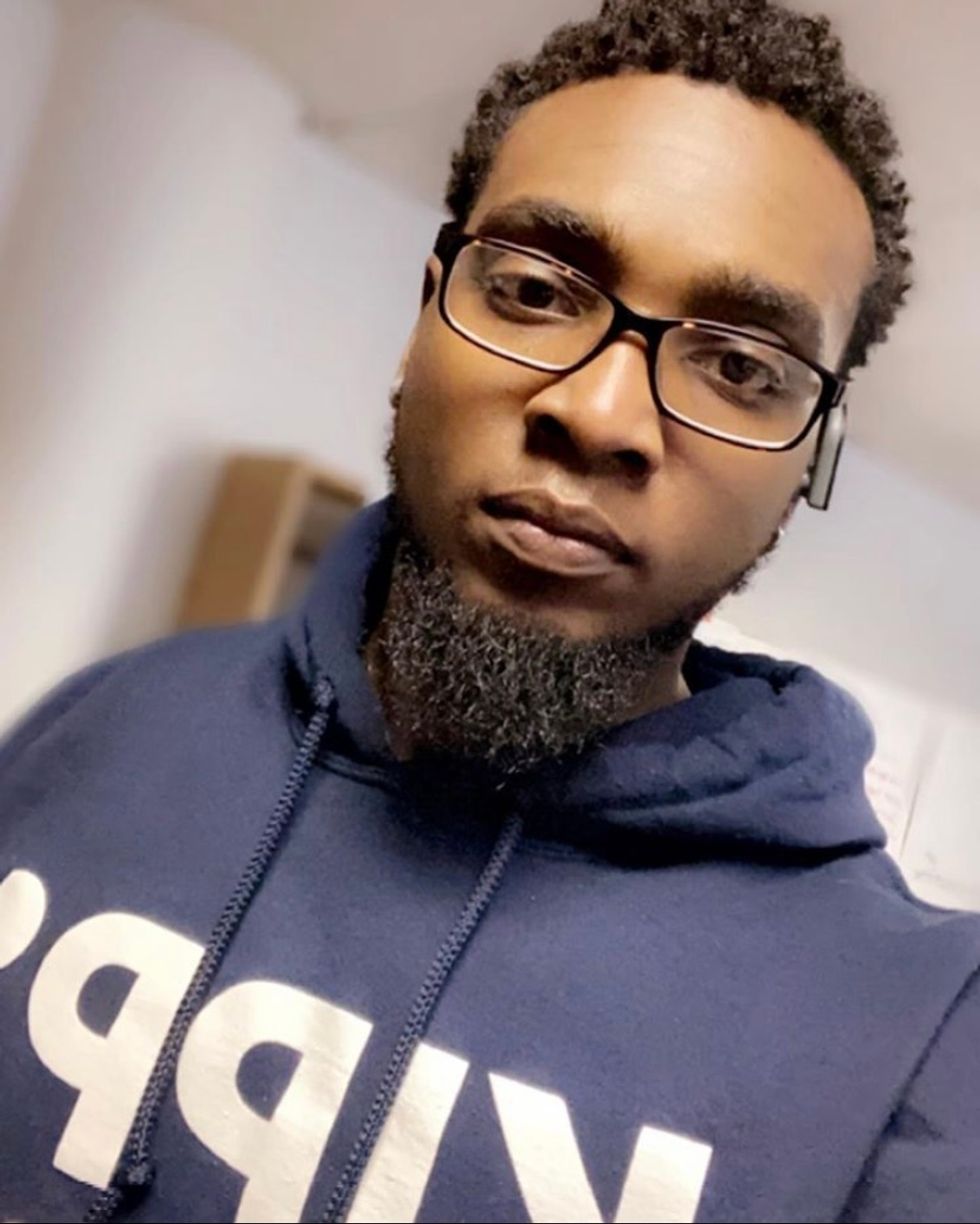
Courtesy of Devin
"I think the biggest moment I realized I was struggling with my mental health was when I moved to a new city by myself in 2017. I recognized that a lot goes into not just being an adult, but having a work-life balance and paying attention to how outside factors impact me. I noticed how I would cling to past romantic relationships and string them out longer than they needed to be. I have decided to seek help since then, but I haven't done so just yet. The main reason is that I have prioritized other things above this and honestly one of the things I factor into it is money. Working in education, I'm not making shit. I do know that I have some assistance in my healthcare package with my job, but I just haven't acted on it yet.
"With trying to balance work and my romantic relationships, people felt like they couldn't read me. When I would be feeling depressed, I would shut down and not be as open. Sometimes I felt that I could articulate what I was going through at the time, the best way I could, but it was either not being received or I wasn't being understood. I have learned from those moments that I need to refine my communication on my emotional state in the future."
Chris, 30

Courtesy of Chris
"I really got a grasp on my mental health when I was in college. I was diagnosed with bipolar depression, and I have tried therapy and prescription drugs. With therapy, I compared it to going to the gym. You go in and once you're done you feel great. But once you leave, you eventually start going back to those old ways—like it was only effective when I was there, not afterward. With the medication, I have tried five to six prescriptions, but things were not working. Since I'm an Illustrator, I've been able to put a lot of emphasis on keeping myself busy with my passion and using it when times get rough.
"With my girlfriend and I, I have always had a hard time expressing myself and getting my point across. It would take me weeks to express something so small that could have been handled sooner if I would've just said something in that moment. I also isolate myself a lot. I don't want to be a burden and bring any bad vibes to anyone when I am feeling down."
"Now that we have a son, I want to say that I have improved a bit. Before, if I would get upset, I would sit in that mood for weeks and sometimes months. Now, I have managed to be upset for a couple of days and sometimes not even that long. When I get stressed out, I want to step away, but you can't do that with a four-year-old, especially during these times. So I try the breathing exercises and stick it out for my son. I want my family to work, so I am putting in the work by communicating and making sure my girl knows that I am still the man she fell in love with, despite my diagnosis. It's an everyday process, but it's important to seek out any positivity and hold on to it."
Avrey, 31
"When I noticed I was struggling with my mental health, it [was] toward the middle of 2019. I put a lot of pressure on myself as a husband and a father of two because I didn't grow up in a two-parent household. Technically, I'm adopted, and not having that relationship with either of my parents is what I have realized really impacted me. My wife and I just started marriage counseling.
"Granted, my wife and I have an immaculate friendship and are wonderful parents to our kids together, but when it comes down to our relationship, we operate differently in what makes us tick. During counseling, one of the hardest parts for me is that I am very vocal and articulate how I feel. But I didn't know I wasn't articulating everything. Whenever there is a conflict or a confrontation, I have a template where I handle every situation the same way and that's not going to work. So for both of us, it has been this peeling of the banana and peeling back these layers so we can get over the hump.
"I commend my wife for being there for me naturally and admittedly I know I pushed her away being guarded and defensive. I grew up in an environment where it's either 'Get them or get got' and I needed to learn how to not be figuratively armed all the time. So now I am working on undoing some of the damage I have caused. I applaud her for being patient with me and it makes me love her that much more.
"For my men who are struggling, it's OK to be vulnerable. It's OK to understand that you may have been susceptible to certain experiences you wish have never happened. Do not allow it to hold you back from who you are meant to be. Us men, we try to shoulder the world of everything that we were told that we ain't and everything we haven't been given. We can't do it all alone. We also have to understand the importance of the Black woman and how she contributes to our lives.
"Black women have been doing the same thing for years and years and that is protecting Black men. So it is up to us to protect Black women by healing ourselves and stopping this vicious cycle of toxic masculinity. We have to take ownership of that."
Featured image by Shutterstock
- Loving My Partner Through His Mental Illness - xoNecole: Women's ... ›
- Mental Health Tips Given By A Black Woman Surviving PTSD ... ›
- 6 Things to Know About Dating While Dealing With Depression ... ›
- How To Maintain Your Mental Health & Sustain Healthy Friendships ... ›
- Mental Health Tips Given By A Black Woman Surviving PTSD - xoNecole: Women's Interest, Love, Wellness, Beauty ›
This Is How To Keep 'Holiday Season Stress' From Infecting Your Relationship
Hmph. Maybe it’s just me, but it seems like there is something really weird happening in the fall season air (because winter doesn’t officially begin until December 21) that cuddle season is in full swing while break-up season is as well. In fact, did you know that break-ups are so popular during the holiday season that December 11 is deemed Break-Up Day?
The reasons why relationships shift around this time vary; however, I did both roll my eyes and chuckle when I read that a very popular one is because it’s an easy way to get out of getting one’s significant other a Christmas present. SMDH.
Anyway, I personally think that the less shallow folks out here may contemplate calling things “quits” or they at least distance themselves a bit from their partner (and what I’m referring to is serious relationships) due to all of the stress and strain that oftentimes comes with the holidays whether it be financial, familial, due to their tight schedules or something else.
Listen, I would hate for you and your man to miss the fun and happiness of experiencing this time of year, all because you are so overwhelmed or irritated that you can’t really enjoy it. That’s why I have a few practical tips for how to avoid allowing the typical holiday season stress from INFECTING your relationship.
Manage Your Expectations
 Giphy
GiphyUnmanaged expectations. If there is a main reason why the holiday season tends to be so stress-filled for so many people, I’d bet good money that this is the cause. And when you’re in a long-term relationship, expectations can manifest themselves in all sorts of cryptic and/or unexpected ways. You might have relatives who assume that you are going to be with them for Thanksgiving or Christmas when you have other plans in mind. You might be thinking that you are going to spend one amount for presents while your man is thinking something totally different. When it comes to scheduling, your signals may be crossed.
And you know what? To all of these scenarios, this is where clear and consistent communication come in. Don’t assume anything. Don’t dictate anything either. From now until New Year’s, mutually decide to check in once a week, just to make sure that you are both on the same page as it relates to the holidays and what you both are thinking will come along with it. The less blindsided you both feel, the less stressed out you will be. Trust me on this.
Set (and Keep) a Budget
 Giphy
GiphyOkay, so I read that last year, 36 percent of Americans incurred some type of holiday-related debt. Hmph. Last year, there was still some sense of normalcy in this country, chile, so I can only imagine what finances are gonna look like over the next several weeks. That said, since I don’t know a lot of people who don’t find being broke stressful, make sure that you and your bae set a budget and then stick to it this year — no ifs, ands or buts.
Because really, y’all — it doesn’t make sense to deplete savings and/or max out credit cards for a few days of giggles only to be damn near losing your mind because you don’t know how to make ends meet come Dr. Martin Luther King, Jr. Day.
And by the way, this tip doesn’t just speak to things like food and gifts; I also mean travel. If it doesn’t make a ton of sense (or cents) to be all over the place this year — DON’T BE.
Keep Matthew 5:37 at the Forefront
 Giphy
GiphyIf off the top of your head, you don’t know what Matthew 5:37 says, no worries, here ya go: “But let your ‘Yes’ be ‘Yes,’ and your ‘No,’ ‘No.’ For whatever is more than these is from the evil one.” That verse right there? Oh, it’s a boundaries lifesaver! I say that because do you see “maybe” or “I’ll think about it” in there? Nope. LOL. It says that you should tell people “yes” or “no” and leave it at that — and that complements Anne Lamott’s quote, “’No’ is a complete sentence” impeccably well. Yeah, you’ve got to remember that anything beyond a yes or no to a request is privileged information; you don’t owe anyone details or an explanation.
Besides, if you are really honest with yourself, when someone asks you something and you give a “Umm, let me think about it” kind of reply, more times than not, you already know what your answer is going to be — so why not let you both off of the hook? Give your response. Commit to that. And let everyone (including yourself) get on with their lives and schedules.
I promise you that when it comes to those holiday parties, you are pissing more folks off by not RSVP’ing or doing so and not showing up than just saying, “Thank you but not this year” off the rip.
Remember That Your Personal Space Is Privilege Not a Right
 Giphy
GiphyA friend of mine recently bought a new house and invited me over to come see it. He’s a single man with no children, so as I was taking in all of the space that he had, especially as I walked through his finished basement, I joked about relatives coming to live with him. “Hell no” and “absolutely not” were pretty much his immediate responses as he went on to say that some folks even had the nerve to be offended when he told them that he had no intentions on taking DNA in.
Ain’t it wild how people think that your stuff is their right? And yes, that brings me to my next point. Your home is your sanctuary space. If you want to host folks this year — cool. If not, ALSO COOL. Please don’t let folks (family included) guilt you into how they want you to act or even into what they would do if the shoe was on the other foot. You are not them — and as one of my favorite quotes states, “If two people were exactly alike, one of them would be unnecessary.” (A man by the name Larry Dixon said that.)
Hell, my friends? They know that I am good for sending them random things that they need or even want all throughout the year. Coming over to hang out at my pace, though. Uh-uh. Chalk it up to being a card-carrying member of the ambivert club yet I like keeping my living space personal — and I sleep like a baby, each and every night, for feeling that way.
Always remember that your space, your time, your resources, your energy and shoot, yourself period (including your relationship), are all things that are your own. You get to choose how, when and why you want to share them. The holiday season is certainly no exception.
Cultivate Some “You Two Only” Traditions
 Giphy
GiphyIt’s not uncommon for some couples to hit me up after the holiday season to “detox.” Sometimes it’s due to the financial drama (and sometimes trauma) that they experienced. Sometimes it’s because they allowed their relatives (especially in-laws) to get more into their personal business than they should’ve. More than anything, though, it tends to be because they didn’t get enough quality time together and so ended up feeling “disconnected.”
Please don’t let that happen. Listen, I’m not even a holidays kind of woman and yet, I will absolutely sit myself down with some hot chocolate and chocolate chip cookies to enjoy a Hallmark holiday film or two. Aside from the fact that most of them are lighthearted and sweet, I also like that they usually focus on couples loving on each other amidst all of the holiday beauty and ambiance — which is something that all couples should set aside some time to do.
Maybe it’s a vacation. Maybe it’s a staycation. Or maybe it’s my personal favorite, A SEXCATION. Whether it’s for a few days, the weekend or even overnight — don’t you let the holidays go by without setting aside time for you and your man to celebrate one another. Don’t you dare (check out “Are You Ready To Have Some Very Merry 'Christmas Sex'?”).
GET. SOME. REST.
 Giphy
GiphyI once read that 8 out of 10 people get stressed out over the holidays and 3 out of 10 lose sleep during to it — and when you’re stress-filled and sleep-deprived, that can absolutely lead to hypersensitivity, making mountains out of molehills and even not being in the mood for sex.
Your relationship can’t afford to go through any of this, so definitely make sure to prioritize rest. I don’t care how unrealistic it might seem during this time, sleep should never be seen as a luxury; it will always and forever be a great necessity.
That said, try to get no less than six hours of shut-eye in (check out “6 Fascinating Ways Sex And Sleep Definitely Go Hand In Hand”) and even ask your bae to take a nap with you sometimes (check out “Wanna Have Some Next-Level Sex? Take A Nap, Sis.”). Not only will sleep help to restore your mind, body and spirit but, when it’s with your partner, it’s an act of intimacy that can make you both feel super connected, even in the midst of what might feel like chaos.
___
Holiday season stress is real. Still, never give it the permission or power to throw your relationship off. Put you and your man first and let the holidays be what they are gonna be, chile.
Let’s make things inbox official! Sign up for the xoNecole newsletter for love, wellness, career, and exclusive content delivered straight to your inbox.
Featured image by Shutterstock
Sergio Hudson On Designing With Intention And Who Gets Left Out Of The Industry
Sergio Hudson dreamt big as a young South Carolina boy staring out of the window of his mom’s Volvo driving down the Ridgeway, South Carolina streets. Those dreams led him to design opulent tailoring that’s been worn by Beyoncé, Queen Latifah, former Vice President Kamala Harris and Forever First Lady Michelle Obama, just to name a few.
Those dreams have come full circle in a new way as he recently collaborated with Volvo for a mini capsule collection suitable for chic and stylish moments this fall. The 40-year-old designer follows a long legacy of fashion aficionados who’ve used their innovation to push the automotive industry forward, including Virgil Abloh, Eddie Bauer, Paul Smith and Jeremy Scott.
Using the same material from the interior of the Volvo EX90, Hudson crafted a wool-blend car coat and waistbelt that combine the vehicle’s Scandinavian design with his signature tailoring and intention. The exclusive collection launched on October 20, and each piece is made-to-order by Sergio Hudson Collections.

Courtesy
In October, I traveled to Charleston with a group of journalists to get a firsthand look at Hudson and Volvo’s location. During a fitting, Hudson said his goal is to make “great work that can stand the test of time.”
“People can look back on and say, ‘I remember when Sergio did that collaboration with Volvo,’” he continued. “Thinking about aligning yourself with classic brands that speak to where you want to go. And I think that's what this collaboration kind of means to me and my business.”
Hudson pinpoints his mom as the biggest influence for his designs. This collaboration was no different.
“This particular coat reminded me of the swing coats that my mom used to wear in the early 90s. You know, diva girls in the early 90s had Sandra suits,” he said, referring to Jackée Harry’s character in 227. “My mom wore those and she would have these matching swing coats to go over them. And that's where the initial idea came. This would be around the same time that we had our Volvo. So she would put on her suit, her swing coat, get in that red Volvo, and go to church.”

Courtesy
With this capsule and beyond, Hudson wants to see more staples rotating in and out of closets this fall. He advises fashionistas to build her closet out with essentials to mix and match that aren’t just stylish but also sustainable.
“It's just those special pieces,” he said. “You can wear the same shirt and pants every day and nobody will notice. But if you have a special boot, a special coat, a special bill, a special bag, that kind of speaks to everything that your style stands about, that is something you should focus on.”
These are the same kind of staple pieces that return to our Pinterest boards and TikTok feeds season after season. Fast fashion has never been Hudson’s aim. “I'm trying to create a special pieces that can stand the test of time,” he said in his warm, Southern accent. “I'm only creating those kind of pieces from here on out.”

Courtesy
For Hudson, this collaboration is revolutionary. It’s his first time working with a car company and experimenting outside of his wheelhouse in this way.
“This is a Scandinavian brand, and, you know, it's 70 years old. I'm an African-American boy from South Carolina that has had a brand for 10 years. So I think bridging those two worlds and seeing the similarities was the beauty of this project,” he explained.
Though Hudson and his partner and CEO of Sergio Hudson Collections Inga Beckham have made massive strides in just 10 years, Hudson said the industry is far from where he wants to see it when it comes to Black representation. He pointed to how few Black designers were at this year’s Met Gala despite the theme being Black dandyism.
“The fact that I dressed 18 people speaks to how many of us weren't there,” he said. He implored more of industries, fashion and beyond, to collaborate with Black designers often.
“Allow mentorship. Allow funding. Allow great design to shine through,” he implored. “When it comes to being a designer of African descent, when you can't get the funding that your counterparts have, you can't compete. When you get opportunities like doing a collaboration with Volvo, or you get opportunities to be at the Met Gala, that's putting us on the equal playing field, but really the funding behind it is what we need to take it to that desk level.”
Featured image courtesy





